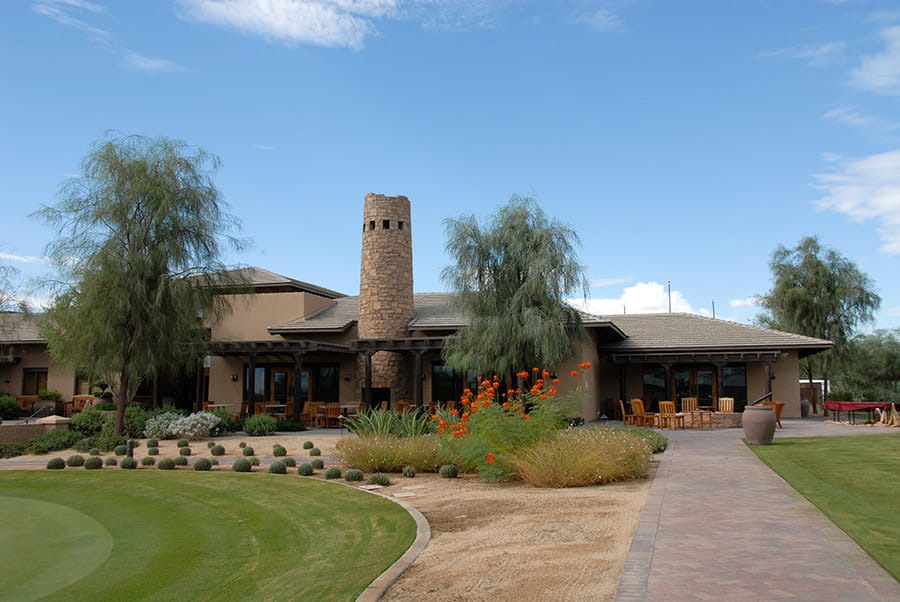Country Club Membership Costs & Benefits
If you’re an avid golfer, you might be considering a golf membership, but how much does a country club membership cost, and what are the perks of joining? In this article, we’ll cover the range of what you might expect so you can determine if a country club is right for you.

Table of Contents
Golf Club vs. Country Club
You may have heard the terms golf club (GC) and country club (CC) used interchangeably, and while they can mean the same thing, typically, a golf club has fewer amenities than a country club.
These extras might include pools, tennis courts, pickleball courts, gyms, social events, upscale restaurants, and more. Unfortunately, having these extras also means the cost increases.
Country Club Membership Cost
The yearly cost of a country club ranges from $300 to $2,000 and varies based on the amenities offered. Most clubs also have a one-time initiation fee ranging from $5,000 to $50,000. This initiation fee can often be split up over multiple years with an installment plan.
Clubs with food and beverage service also will require a minimum amount to be spent in the clubhouse. This typically ranges from $50 to $100 per month.
Here’s a table with some examples of what you might spend for different types of clubs:
| Golf Club Type | Initiation | Dues/mo | Food/mo | Total/mo |
|---|---|---|---|---|
| Golf only club | $0 | $375 | $50 | $425 |
| Club with limited amenities | $3,500 | $500 | $50 | $550 |
| Club with full amenities | $20,000 | $700 | $75 | $775 |
| Elite course with full amenities | $50,000 | $800 | $100 | $900 |
The actual costs will vary based on the region you’re in, how elite the golf course is, how exclusive the membership is, and the amenities offered.
Types of Memberships
Some clubs offer different types of membership that may change the cost somewhat. These include:
- Junior or executive membership: This is typically a discounted initiation (sometimes even delayed or on an extended payment schedule) and possibly discounted dues for younger members. Even those under 40 may get a discounted rate at some clubs.
- Social membership: If you’re not a golfer, you can attend club functions at a lower rate. This may include, or there may be, other memberships that include specific non-golf amenities like swimming and tennis.
- Family membership: Often, there are package deals if additional members of your family are joining the club. This may vary based on whether they’re golfing or using other amenities.
- Company membership: This is for company owners who purchase multiple memberships at a discounted rate. Their sales representatives often use them.
Additional Expenses of Membership
In addition to the initiation and regular monthly fees of joining a club, there are some other hidden expenses that you should consider before joining.
- Cart fees: If you are riding on a cart, there may be an additional fee. There may also be a discounted rate plan.
- Guest fees: If you’re bringing guests, there is likely a guest rate. Sometimes you can buy discounted passes, or some may be included with membership.
- Gratuity: You’ll likely need to tip for food and beverage. Sometimes this is automatically included when making purchases.
- Locker and storage: These may be included with membership or an additional fee (sometimes optional) if you want a locker and to store your clubs at the course.
- Caddie fees: You may take a caddie at some courses and pay an additional fee.
- Course improvement assessments: Occasionally, courses need to make improvements beyond what can be afforded with dues. In this case, all members are charged a small assessment to their monthly dues. This may be uncommon, but you can ask the club or other members about it before joining.

Top 10 Reasons to Join a Country Club
1. Fast Play
In most cases, the people who have joined a country club are regular golfers who know how to play efficiently. Of course, you’ll still find some higher handicap players at a private club, but they’ve played the course and are typically quicker. So getting stuck behind groups playing 5-hour rounds is less likely to happen.
2. It’s Easy to Get Tee Times
Private clubs typically keep their membership at a manageable number for the course. This means it should be easier to get tee times, and often clubs have an app or easy way to schedule your own tee time.
3. Making Friends
Over time you’ll end up seeing the same faces around the course and finding some people you enjoy playing with. You’ll be able to find their names on the tee sheet and join up for a round or hang out and grab a beer afterward.
4. Nicer Course Conditions
Members tend to take better care of their golf course and often have better grounds crews and superintendents. This means better course conditions and better greens.
5. Golf Tournaments, Leagues, and Events
Golf clubs usually have multiple golf tournaments and events throughout the year. These include team events like a member-only tournament (member/member) and a guest tournament (member/guest). Individual or randomly paired team tournaments and weekly men’s and women’s league events.
6. Practice Facilities
If you typically go to the driving range and spend money on a bucket of balls, now you can get this included with your membership. You can always drop by to hit some balls, practice putting, or chipping if it’s near your home. You’ll also have access to a pro who you can pay for golf lessons, as well as access to demo clubs and club fittings. Some courses also offer access to golf simulators when it’s the off-season.
7. Access to Other Courses
Some memberships include a reciprocal membership with other courses. This means their members can play your course, and you can play at theirs, often in a limited fashion. Private clubs also may open up limited tee times when the pro at another club calls on behalf of a member. This is a favor and not something to be expected or used often. It also likely only applies to similar caliber clubs or clubs with which your pro has a relationship.
8. Other Amenities
Country clubs offer a variety of non-golf amenities like spas, tennis courts, gyms, pickleball courts, fitness classes, pools, hot tubs, restaurants, and more.
9. Social Events
Some clubs have a wide variety of social events outside of golf-centric events. These include dinners, dances, themed parties (e.g., fall party or casino night), holiday events, trivia, tastings (food, wine, beer, scotch), and more. This allows you to make friends and bring your significant other or children.
10. Business Opportunities
Even if you’re not in sales, you may find business opportunities by joining a country club. The membership is often thriving in their careers and could lead to deals, job opportunities, or other valuable connections. The elite clubs are full of business owners and executives.
How to Join a Country Club
If you’re interested in joining a country club, here are some steps to get started:
- Select some potential clubs: Find courses convenient to where you live or work and build a list to research.
- Research costs and amenities: Look at the clubs’ websites to see what they offer and if they align with your needs. If you’re price-sensitive, you’ll want to avoid places offering amenities you won’t use. Many clubs won’t list the price to join, but you can try searching for “club name” monthly dues or “club name” initiation fee to get a ballpark. If a club is exclusive, it’ll likely say on its website that you need several sponsors to join.
- Reach out: Once you’ve narrowed down your list, try reaching out to the club and let them know you’re interested in learning more about membership. There is typically a single person in charge of membership, so there should be some contact information for that person on the website. They can provide details on the steps to join and if there is a waitlist. They may also offer a tour or invite you to a prospective member event. If you’re serious about joining, you may also be able to play a trial round (at the guest fee price) to make sure you like the course.
Joining an Elite Country Club
It’ll usually be more difficult to join if you’re looking at an elite country club. Most will require you to have existing members sponsor your membership. At some clubs, this could be as simple as talking to the membership coordinator, who will have you play with and meet some members before you’re allowed to join, while at others, this requires you to network with the right people. At the highest level, you might need to be invited as a guest multiple times before being extended an invitation to join.
Here are a few options to consider for finding the right connections:
- Join as a social member and meet current members. There may be fewer restrictions for social membership.
- Network with business people in your area. If you’re networking with successful people, you’ll likely find that some of them are members of various clubs.
- Start by joining a less exclusive club. It’ll look better if you’re coming from another club, and you’ll also be meeting the type of people who join country clubs and may have friends in the club you’re interested in.

Important rule: Don’t ever pressure anyone to invite you or be aggressive about joining. This is the reason the rules are there in the first place. They’re trying to shelter the members from bad experiences, annoying people, and people who only want a transactional relationship.
Questions to Ask When Joining a Golf Club
Here are a few questions to ask when considering joining a club:
- How many members do you have, and is there a waitlist?
- What is the process for joining? Do you need to know a member?
- How are tee times booked? When are they available? Are specific periods or days blocked off?
- What is the average age of members?
- What is the cost of joining, and what additional yearly costs are involved?
- Are there any current improvements underway or planned?
FAQs
No. Typically there isn’t a handicap requirement to join a club. However, you may be expected to keep pace, have good golf etiquette, dress appropriately, and treat the course respectfully. However, a low to mid handicap may help make it clear that you’re an active player that will understand these conventions.
In most cases, no. However, some courses charge the initiation fee as part of the ownership of the course and include voting rights along with it. In this case, it may be possible to sell the membership back to the course or another member if you leave.
Some of the most elite clubs, where you likely need to be asked to join, include Augusta National (Georgia), Shinnecock Hills (New York), Pine Valley (New Jersey), St Andrews (Scotland), Merion (Pennsylvania), Royal Melbourne (Australia), Muirfield (Scotland), Cypress Point (California), Golf de Morfontaine (France), Baltusrol (New Jersey), and Congressional CC (Maryland).
Certainly not. If you golf often enough (2+ times per week), some less expensive golf clubs might save you money.